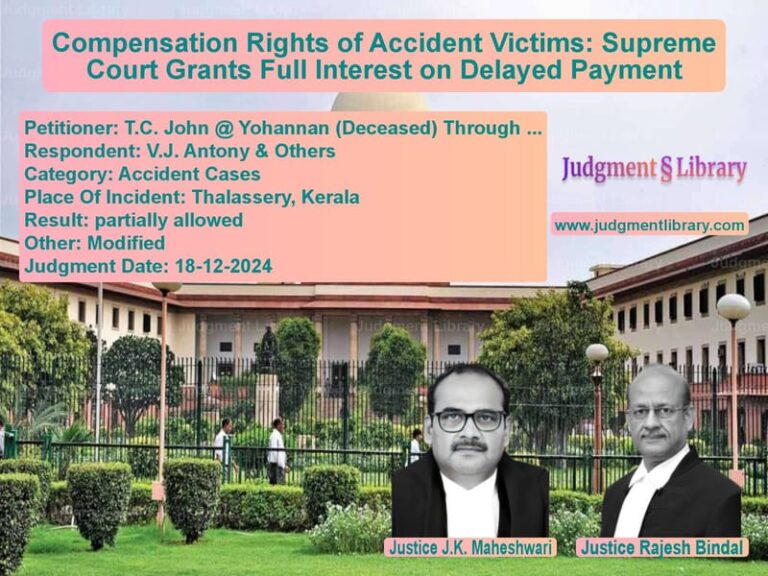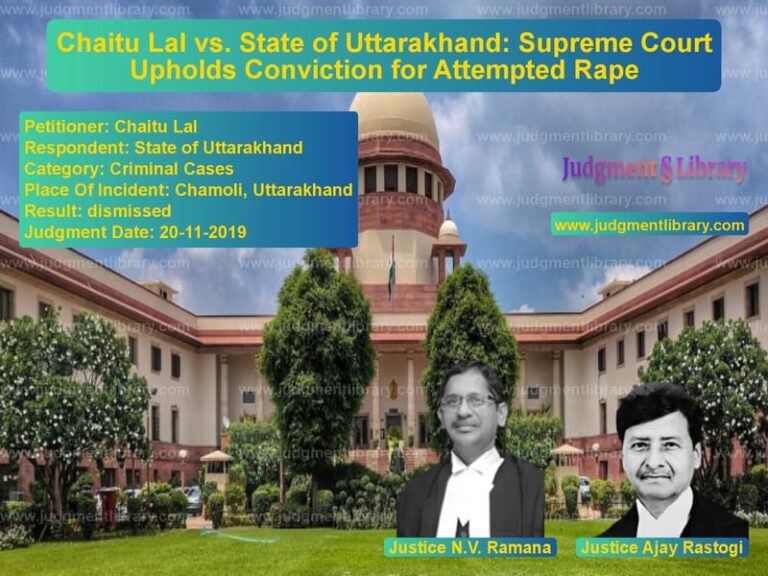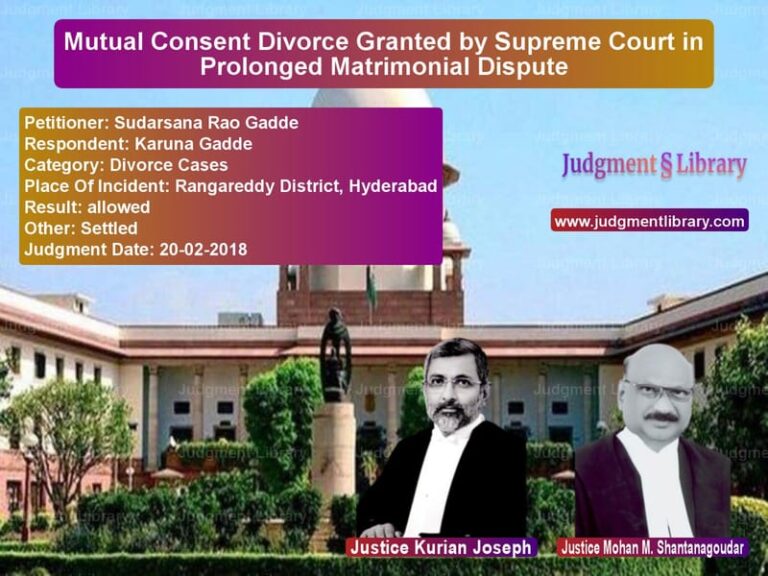Port Limits Expansion: Supreme Court Dismisses Essar Bulk Terminal’s Challenge Against Gujarat Government
The Supreme Court of India recently delivered a verdict in the case of Essar Bulk Terminal Limited & Anr. v. State of Gujarat & Ors., addressing the legality of a notification issued by the Gujarat Government under the Indian Ports Act, 1908. The Court upheld the expansion of Hazira Port limits and dismissed the challenge brought by Essar Bulk Terminal Limited (EBTL), reinforcing the state’s authority in port development decisions.
Background of the Case
The case revolved around a notification issued on January 18, 2016, by the State Government of Gujarat, expanding the port limits of Hazira Port. EBTL, a private company that had invested significantly in port infrastructure, challenged the notification, arguing that the expansion of port limits affected their reclaimed land, which they had developed through significant financial investments.
The case required an examination of the State’s authority under Section 5 of the Indian Ports Act, 1908, and whether Essar had any legitimate claim over the reclaimed land.
Key Legal Issues
- Whether the Gujarat Government had the authority to expand the limits of Hazira Port under Section 5 of the Indian Ports Act.
- Whether EBTL had any legal entitlement over the reclaimed land that was included in the expanded port limits.
- Whether the expansion of port limits violated Essar’s rights or was against public interest.
Arguments Presented
Petitioners (Essar Bulk Terminal Limited & Anr.)
The petitioners contended:
- They had spent substantial sums on reclaiming land, which was now affected by the port expansion.
- The notification was issued hastily and arbitrarily, without considering their objections.
- Their port facilities were necessary for their business operations, and the expansion would hamper their ability to use the reclaimed land.
- The Gujarat Government’s actions indirectly favored other private entities, particularly Adani, without a competitive bidding process, violating the Gujarat Infrastructure Development Act, 1999.
- The notification was ultra vires of Section 5 of the Indian Ports Act, which mandates that alterations to port limits must be in public interest.
Respondents (State of Gujarat & Gujarat Maritime Board)
The respondents defended the notification, arguing:
- The expansion was necessary due to increasing port traffic and was undertaken in public interest.
- The reclaimed land legally belonged to the Gujarat Maritime Board (GMB), and Essar had no ownership rights over it.
- Essar’s claims were based on expired Memorandums of Understanding (MOUs), which did not confer any legal rights.
- Essar’s real intention was to convert its captive jetty into a commercial port without going through a proper bidding process.
- The port expansion was essential to accommodate growing vessel traffic and ensure port security and customs operations.
Supreme Court’s Analysis
1. Validity of the Port Expansion Notification
The Supreme Court held that the Gujarat Government was well within its rights to alter the port limits under Section 5 of the Indian Ports Act. The judgment emphasized:
“The power of the Government to alter the limits of any port must be exercised in public interest. The affidavits filed by the State Government and the Gujarat Maritime Board show that the number of vessels at Hazira Port was expected to increase dramatically, requiring expansion for customs, safety, and operational efficiency.”
2. No Ownership Rights Over Reclaimed Land
The Court ruled that EBTL had no legitimate claim over the reclaimed land, as the Gujarat Maritime Board retained ownership. It observed:
“The ownership of reclaimed land shall vest with the Gujarat Maritime Board and the Government of Gujarat. The appellant cannot claim any proprietary rights over it.”
3. No Violation of Public Interest
The Supreme Court found no evidence to support Essar’s claim that the expansion was against public interest. Instead, the judgment noted:
“The expansion of port limits is justified as it facilitates customs operations, ensures safety, and accommodates increasing port traffic. It does not violate public interest but rather serves it.”
4. No Breach of Competitive Bidding Norms
The Court dismissed Essar’s argument that the expansion favored other private entities, particularly Adani, without a competitive bidding process. It ruled:
“The port expansion does not confer any undue advantage to any private entity. It is part of the government’s broader port development strategy.”
Supreme Court’s Verdict
The Supreme Court dismissed Essar Bulk Terminal Limited’s appeal, ruling:
- The Gujarat Government had the legal authority to expand the port limits under Section 5 of the Indian Ports Act.
- Essar Bulk Terminal Limited had no ownership or exclusive rights over the reclaimed land.
- The expansion of Hazira Port limits was justified in public interest.
- There was no procedural illegality in the notification issued by the Gujarat Government.
Implications of the Judgment
This ruling has significant implications for port development policies and private sector participation in infrastructure projects:
- Strengthening State Authority: The judgment reaffirms the power of state governments to expand port limits in public interest.
- Clarification on Reclaimed Land Ownership: The ruling establishes that land reclaimed during port development remains under government control.
- Deterring Unsubstantiated Private Claims: The judgment discourages private entities from challenging government infrastructure policies based on expired agreements or informal arrangements.
- Encouraging Transparent Infrastructure Development: The case highlights the importance of fair bidding processes and adherence to statutory regulations.
Conclusion
The Supreme Court’s decision in Essar Bulk Terminal Limited & Anr. v. State of Gujarat & Ors. underscores the primacy of public interest in port development policies. By dismissing Essar’s challenge, the Court has reinforced the authority of state governments in managing infrastructure projects and ensured that strategic expansions remain unhindered by private interests. The ruling serves as a significant precedent for future disputes involving port limits and private sector participation in public infrastructure.
Petitioner Name: Essar Bulk Terminal Limited & Anr.Respondent Name: State of Gujarat & Ors.Judgment By: Justice R.F. Nariman, Justice Navin SinhaJudgment Date: 22-02-2018
Don’t miss out on the full details! Download the complete judgment in PDF format below and gain valuable insights instantly!
Download Judgment: Essar Bulk Terminal vs State of Gujarat & O Supreme Court of India Judgment Dated 22-02-2018.pdf
Direct Downlaod Judgment: Direct downlaod this Judgment
See all petitions in Company Law
See all petitions in Corporate Compliance
See all petitions in unfair trade practices
See all petitions in Judgment by Rohinton Fali Nariman
See all petitions in Judgment by Navin Sinha
See all petitions in dismissed
See all petitions in supreme court of India judgments February 2018
See all petitions in 2018 judgments
See all posts in Corporate and Commercial Cases Category
See all allowed petitions in Corporate and Commercial Cases Category
See all Dismissed petitions in Corporate and Commercial Cases Category
See all partially allowed petitions in Corporate and Commercial Cases Category







